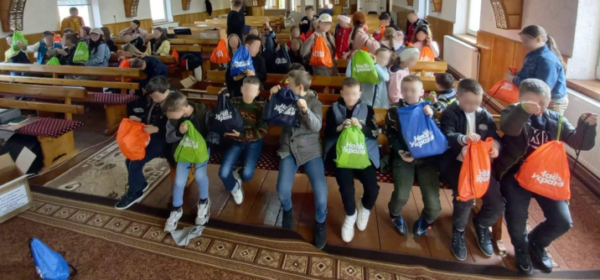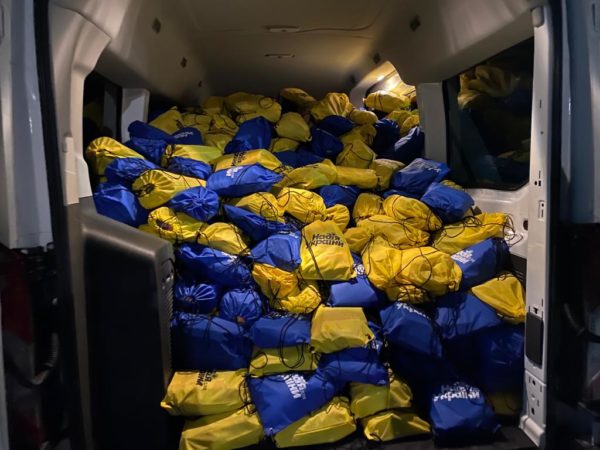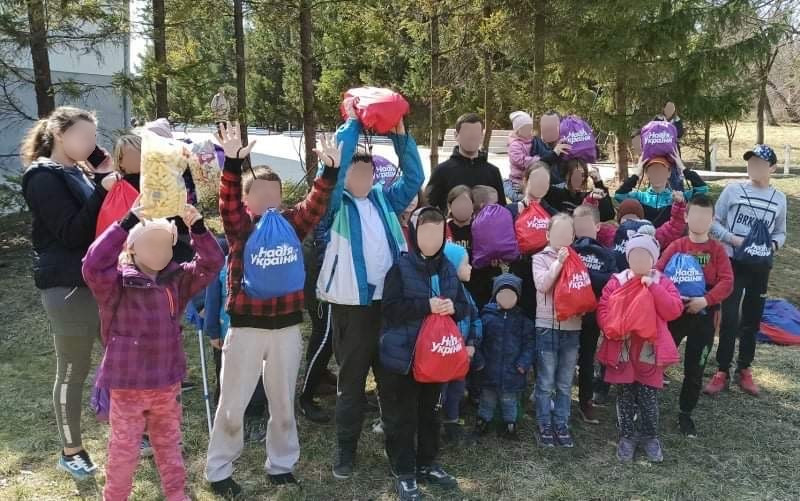Addressing the Trauma of Children
By Lydia Kaiser
A look at what the church can do in cases of world tragedies like Ukraine and in everyday lives across every nation, with special consideration for use of the resource, “Do You Wonder Why?”
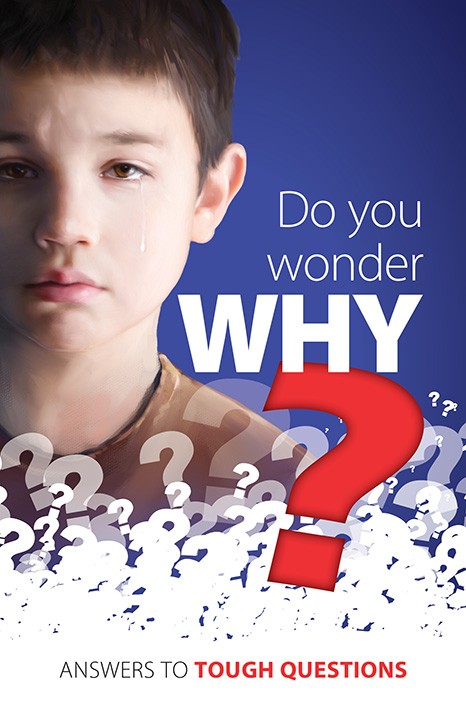
When the USA was attacked on 9/11/01, the President of Child Evangelism Fellowship (CEF), Reese Kauffman, began to feel grieved that CEF had little to help children going through traumatic events. “I knew that when we suffer trauma, it causes us to search for meaning in life and question everything. I’ve noticed there is a short window when people are more open to God, but the window can suddenly close with disbelief, rejection, and despair. We had been bringing the Gospel message to children in schools, parks, and back yards for 64 years. But a child often can’t hear the Good News of Jesus when suffering trauma even though Jesus is the only answer to all the pain in this world. We had to do something more.”
Enter two middle-aged women from CEF International Headquarters in Missouri hanging on for dear life as their young escort careens around New York City traffic. Lynda Pongracz and Brenda Hanson were on assignment by Reese Kauffman to conduct research and propose a resource for children. Experts in the field of education, the women had a list of questions for first responders, counselors, teachers, parents, and others who had lived through the attack while caring for children.
Their first day into the interviews, something became apparent to them. They needed to scrap the clipboards and formal questions and practice a more casual and patient type of empathetic listening. People didn’t bare their soul to someone busily writing on a clipboard–they needed eye contact and to see their own tears reflected in the tears of another. After each interview, the ladies huddled to scrawl notes from each person’s revelations.
“Even though our teacher training institute has an extensive module on helping children in trauma, we needed a simple resource that could be used en masse when there’s a catastrophe,” says Lynda, Executive Director of Education for CEF. “Caregivers needed help as they tried to help children deal with something that overwhelmed them as well.”
Even though our teacher training institute has an extensive module on helping children in trauma, we needed a simple resource that could be used en masse when there’s a catastrophe.
Feelings and Questions
Children cannot verbalize what is happening in their psyche when suffering trauma. They move on as best they can because no other options seem apparent. This is why adults assume that ‘children are resilient.’ However, childhood trauma becomes ingrained and the consequences eventually surface in unexpected ways, much like a person can’t hold multiple balloons under water for a length of time before one escapes to the surface.
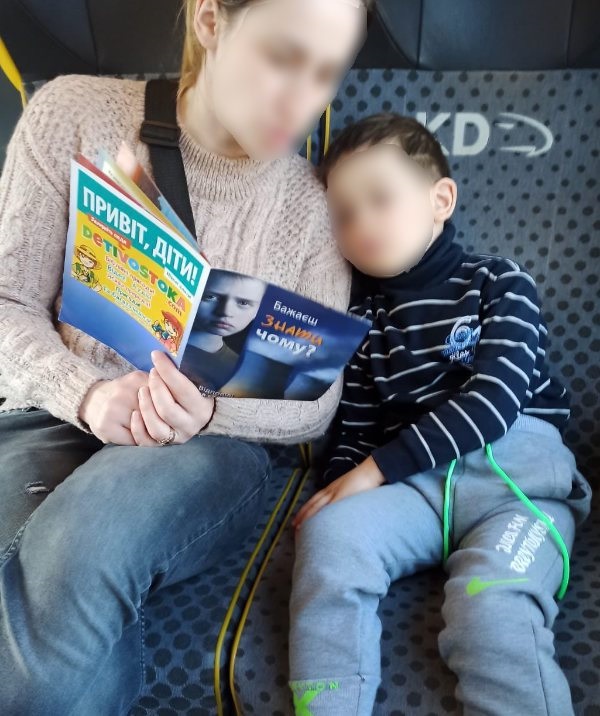
Ukrainian mother and boy on train in Poland reading a Do You Wonder Why? booklet that was handed to them at the station
At NYC bus stops, in the subway, and on the ferry, God brought one divine appointment after another as the ladies took their time to listen from the heart, especially about the responses of children as related by their caregivers. “We knew that people first have to talk about their feelings, but discovered that after a catastrophe the first feeling to be explored is fear. Then grief, anger, and helplessness often follow.”
Today, hearts are broken for the children of Ukraine and surrounding countries. At least half of Ukraine’s children have fled the country. That would be over 3 million children in a country not their own, in addition to children who have been displaced from their homes within Ukraine. Imagine what they feel while hunkering down in basements and bomb shelters! These children are experiencing a deep trauma that could affect their sense of well-being for the rest of their lives. The terror is real as over 200 children have died (as of 4/18/22) and hundreds wounded. Schools, shelters, and evacuation routes are bombed, showing no place is safe.
Children are with mothers who are themselves frightened for safety, where they will land, and for their husbands left behind to fight. Their trauma becomes their children’s trauma. Even children in destination countries are having their world shaken as they watch this catastrophe and fear war will come to their country.
Back in 2002, as the women collected data from NYC, a theme emerged of raw questions about God—“Does He even see this? Does He care about me, personally? Why do so many bad things happen in the world? How could a loving God allow this to happen?”
One might notice there wasn’t a question of God’s existence. CEF staff have observed that many children don’t have difficulty assuming the existence of God, but if their questions go unanswered over time, and they hear from others that a loving God can’t possibly coexist with tragedy, they lose their innate faith in God’s existence.
A Resource is Born
The resulting resource from that NYC trip was a 14-page booklet, Do You Wonder Why? Thousands of copies were printed and distributed to key locations throughout the USA for rapid deployment. When disasters struck, local CEF workers were mobilized in partnership with other agencies to quickly get the booklets into the hands of children and their parents during that short window of time when hearts are open.
The first test of Operation Wonder Why came in February 2003 in response to the Columbia space shuttle tragedy. Thousands of booklets were distributed in Texas, along the debris path, and at Johnson Space Center. Recipients were extremely grateful.
In 2004, the booklets were distributed in Florida after four hurricanes brought deep anxiety to residents—especially children. After cooperating with the Salvation Army and local churches to distribute 40,000 booklets, CEF received the following note from a Salvation Army worker:
I can’t begin to tell you just how valuable the booklets were. Even though our intentions are good, the way we minister to children during these times does not convey to them the answers to their difficult questions. Your booklet not only addressed their questions, but also provided them with hope. It was even encouraging to me as a mature believer.
To the surprise of volunteers, even public schools allowed distribution.
Seeing that this campaign was truly helpful energized CEF to distribute 400,000 booklets in the wake of Hurricane Katrina. To the surprise of volunteers, even public schools allowed distribution. Translation into other languages also began around this time. The distribution opened doors for CEF workers to conduct Good News Clubs in many shelters and eventually refugee camps all over the world. To date, over eight million booklets have been distributed in 54 languages. In addition, the online digital flipbook and video have been viewed over a million times.
CEF has had 69 full-time workers in Ukraine with over 1,200 volunteers, conducting Good News Clubs every week to reach children with the Gospel and disciple them in the Bible. These regular workers have now become crisis ministers. CEF also has workers in every bordering country, ministering to the refugees. Although this ministry comes in practical ways such as 100,000 backpacks with food, candy, and toys, workers believe the most important item in the bag is Do You Wonder Why? There is also a children’s booklet titled Meet the King! which is about the life, death, and resurrection of Jesus.
Any person suffering trauma needs to talk about what happened and how they feel. The Do You Wonder Why? booklet has questions and response space for the reader to express themselves.
Caregivers Get Help Too
Any person suffering trauma needs to talk about what happened and how they feel. The Do You Wonder Why? booklet has questions and response space for the reader to express themselves. It facilitates meaningful discussion between caregivers and children as they read it together. Besides addressing the questions above about God and tragedy, the final sections are “How Can I Get Through This Terrible Time?” “How Can You Become Part of God’s Family?” and “God Will Comfort You.” The booklet has brought comfort to caregivers as well as children. Following are just two of many testimonies:
During the COVID pandemic, Do You Wonder Why? was read to children in an online Good News Club®. A mother in Michigan who was listening in on the club called the club teacher and asked to hear it again. She cried with relief to know these truths and received Jesus as Savior. Her whole family began attending online church at the club teacher’s church.
In Haiti after an earthquake, a volunteer was refused permission to take the booklet into a school, so he decided to wait for children on the street outside the school to hand out booklets. A parent asked to have one so he could see what was given to the children. After reading it he said “You should not only give these to children! We as adults need this too! I have been struggling with despair since the earthquake, blaming God for what happened. I stopped praying and going to church. But this booklet answered all my questions! That’s all I needed to hear. Thank you!”
A video of Do You Wonder Why?, narrated by a child, can be seen here: Do You Wonder Why? – Child Evangelism Fellowship (cefonline.com) This video is also being circulated online in Ukraine in the Ukrainian language. Hundreds of thousands of booklets are already in distribution in and around Ukraine and funds are being collected to print a total of 5 million in the 11 languages of Ukraine and bordering countries.
In bordering countries, CEF has 116 full-time workers, plus thousands of volunteers and partnering churches who are responding together in the Hope for Ukraine effort. Female CEF Ukraine staff who have fled are teaming up to assist in reaching refugee children. Male Ukrainian staff between 18 and 60 years old are being conscripted to fight, so CEF is also providing financial assistance for their families. Below is testimony from a CEF worker about children in families who have become refugees twice.
“Moving is never easy at the best of times. However, being forced to move always leaves its mark. In 2014, when the conflict in the Donbas area of Ukraine broke out, many places were bombed and part of the area remained under Russian control. Many families, even whole churches, needed to leave their homes and move to other areas to continue their lives.
“Eventually a number of families settled in the Irpen area and started the “Anchor” church. However, in the past weeks, they found themselves, again, in an area under heavy attack and they were forced out of their homes for the second time. These families are now in the Chernovtsy area.
“Displaced, nowhere to call home and yet somehow able to serve! They are a great help to the CEF workers in the area with distribution of humanitarian aid and holding children’s programs with refugee children (30) and their families.
“Praise God that He is able to offer hope in a hopeless situation and prove to the world that His children are indeed anchored in what really matters in this life.”
Passion and Compassion
Is the church ready for the Gospel opportunities offered by tragedies? As much as the world would like to think that “all we need is love,” humans are made in the image of God so also need truth and meaning. As much as we’d like to think that knowing truth is enough, humans are made in the image of God so need love. God wrapped His truth in sacrificial love. In chapter one of the Gospel of John we read how Jesus came full of both grace and truth—not “balancing” one with the other, but “full” of both.
It is important for anyone overcoming trauma to repeatedly review basic truths in order to make sense of the world, life, self, and God—a loving God who sees and cares. If these truths are not readily available, a person may rehearse unhealthy thoughts, leading to unhealthy feelings, and life becomes unbearable. This is true regardless of the type of trauma.
Reese Kauffman saw through God’s eyes that horrible situations are an opportunity like no other to answer life’s most important questions for those who are desperately seeking, sometimes just for a short time. “The window of opportunity with children is especially important as 63% of adults who profess Jesus as Savior came to Christ by age 14. All people, but especially children, need to know how God’s Word deals with tough questions and how Jesus can bring PEACE and HOPE even amid the worst circumstances.”
~ Do You Wonder Why? booklets can be ordered in quantities at Do You Wonder Why? (cefpress.com)
Citations
As of 5/5/22: 205 children have died in Russia’s war against Ukraine; teenager injured in a detonation in Kyiv region | Ukrayinska Pravda
In 2015, the National Association of Evangelicals polled their membership to learn at what age members made this most important decision of their lives. 63% made the decision between ages 4 and 14. “When Americans Become Christians”
